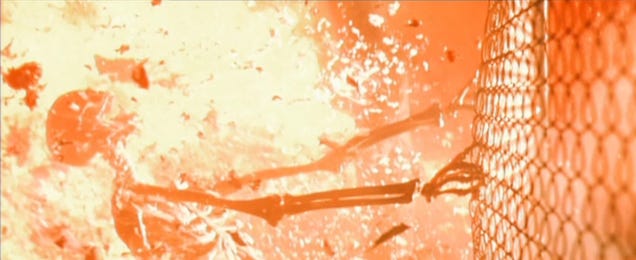Have We Stopped Fearing Nuclear War?

It
came up the other night as dinner conversation. “Where do you think the
next nuclear war will break out?” I asked. Everybody had an opinion.
“Obviously on the Pakistan border,” said one person.
Another,
known for his weird opinions, piped up: “In the arctic, of course.
Either to protect new trade routes, melt the rest of the ice, or both.”
“What about China?” somebody mused.
“No, I
think they’re more interested in economic power,” replied the person
next to me, joining the conversation. “I don’t think they really want
all-out war.”
What did I
think? I was inclined to agree with the person who referred to Pakistan —
and, by extension, India. I could also see it breaking out in the
Middle East. Obvious places, where militaries have atomics and war is
already tearing communities apart.
Nobody said they thought nuclear war was impossible. We all had ready theories about where the next one would start. Which made me think, inevitably, about that time a few weeks ago when we learned all those terrible things about the upcoming Terminator Genisys movie plot.
Let’s set
aside the issues with who Sarah Connor is, and retcons and all that.
What really busted my chops was the reason why the movie wouldn’t be
focused on averting nuclear holocaust.
According to Entertainment Weekly:
The film also adapts to our current cultural anxieties. The threat of nuclear holocaust that freaked out ’80s audiences has been eclipsed by our fear of cyberattack. “Skynet no longer has to break down our front door because we line up in front of Apple stores to invite it in,” [producer David] Ellison says. “We’re constantly giving away our privacy.”
So worrying about global thermonuclear war is retro, like 80s teen flick Wargames.
Let’s just
take what Ellison says at face value for a moment, and consider that
people might find digital attacks scarier than nukes. Maybe that’s true,
but one of the best-known cyberattacks in history was the Stuxnet worm,
unleashed by the US government against — you guessed it — a uranium
enrichment facility in Iran. (Enriched uranium is used both for making
bombs and nuclear power facilities.) So
“cyberattack” isn’t really something that we can separate out from
“nuclear holocaust” very easily. The two things have become wedded, both
in reality and in the public mind.
Even in
cheesy pop culture stories about the deadly cybers, the usual fear at
the bottom of the “stop that hacker” plot is that somehow an evil
computery thing will be used to unleash a bomb. Indeed, that trope grows
partly out of Cold War classics like Wargames and the original Terminator
movies, where many audiences first because acquainted with the idea
that we don’t need Soviets and Americans punching red buttons to start a
war. With computers
controlling our weapons systems, nuclear annihilation could happen
because of a software bug — or because the weapons system itself became
sentient (as so often happens in these situations).
Journalist George Johnson recently had a moving piece in the New York Times
about visiting the site of the “Woodpecker” in Ukraine — a massive wall
of radio towers designed to give distant early warning of a U.S.
nuclear attack on the U.S.S.R. Though the place is slowly crumbling to
rust, he ponders how the threat it monumentalized is far from over. He
imagines the “next nuclear catastrophe — deliberate or accidental, and
of a vastly more devastating scale.” These decaying defenses aren’t
signs that nuclear war is no longer terrifying to us. They’re simply a
previous generation’s way of dealing with a horror that still haunts the
world.
I think probably the science fiction writer Maureen McHugh, in her short story collection After the Apocalypse, comes the closest to capturing our nuclear fears in this century.
In
these interlinked stories, dirty bombs are going off in cities pretty
regularly. They aren’t annihilating all of humanity — they are lobbed
across borders by non-state actors, the way gunfire is today. They’re
just one more rip in the social fabric, along with plagues and
indentured servitude and national borders bristling with guns.
Civilization-erasing weapons are part of our everyday background stress in the twenty-first century. We don’t fear nukes less
than the idea that the NSA and Uber dipshits are tracking our movements
through our phones. But we also don’t see a big distinction between
controlling people’s computers and controlling a massive arsenal. It’s
all connected.
I hope by now you understand that I’m not just talking about flaws in the new Terminator
movie’s alleged plot. I am talking about how nuclear holocaust is still
an almost incomprehensible horror to most of us. But now we know it is
not the only way that the world might end. There are other ways, maybe
slower or less obvious, that might come first.
No comments:
Post a Comment